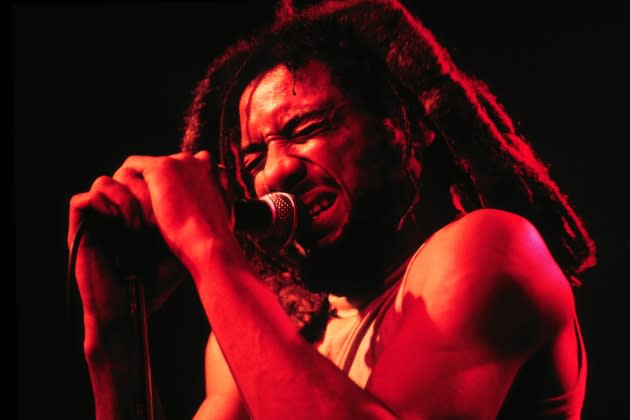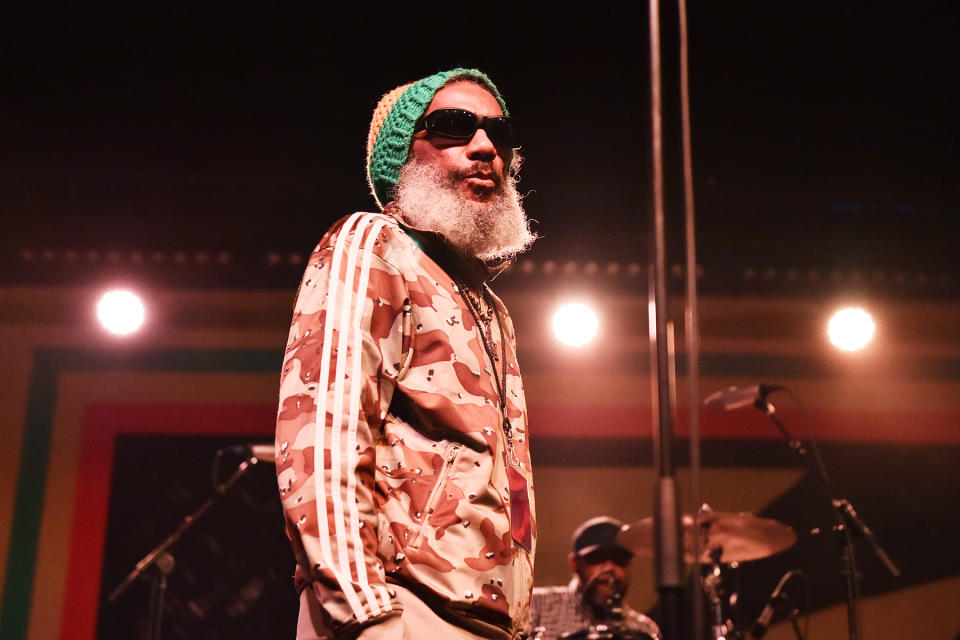Bad Brains Singer H.R. Screams in Pain from Stabbing Headaches That Threaten His Career

Guttural screams, every 15 minutes. That’s become the tragic routine of H.R., the mesmerizing singer of influential hardcore band Bad Brains. Since 2014, H.R. has been suffering from an excruciating type of rare head affliction known as SUNCT headaches that leave him all but devastated.
“I have sharp, stabbing pains every couple of minutes in my brain for a couple of hours,” H.R. tells Rolling Stone. “Then it goes away — and then it comes back.”
More from Rolling Stone
Jesse Malin Honors an Old Friend and Classic New York in 'Todd Youth' Video
Supergroup Saudade Preview New EP with Devastating Instrumental 'Crisis'
Empath's 'Active Listening: Night on Earth' Is a Noise-Pop Gem
The pain is so severe that the 67-year-old, born Paul Hudson, spends most of his days curled up in bed, dreading the arrival of the next wave. SUNCT headaches — Short-lasting Unilateral Neuralgiform with Conjunctival injection and Tearing — have been so debilitating to H.R. that in 2017 he underwent brain surgery to try to alleviate the pain. Instead, it left him in debt, a financial situation only exacerbated when the headaches forced the cancellation of his 2023 tour.
But H.R. will not be deterred. “I was a little lethargic and despondent after canceling the tour,” he says, “but I just kept my head up and rose above it.”
BAD BRAINS STRUCK LIKE A lightning bolt in 1977 after Paul “H.R.” Hudson, his drummer brother Earl Hudson, bassist Darryl Jenifer, and a guitarist known as Dr. Know joined forces to form what would become Washington, D.C.’s most explosive hardcore band. A fusion of punk, reggae, and heavy metal, Bad Brains’ all-Black lineup was a trailblazing first, setting the stage for numerous acts to follow. Widely credited as pioneers of hardcore punk, Bad Brains’ 1982 self-titled debut (also known as The Yellow Tape or Attitude: The ROIR Sessions) included frenetic cuts like “Sailin’ On’” and “Attitude” juxtaposed with the abruptly downtempo reggae of “Jah Calling” and “I Luv I Jah.”
But “Banned in D.C.,” another raucous punk-rock anthem from the LP, summed up the band’s ethos — at least at the time. The song came about after the group was unofficially “banned” from nearly every club in D.C. due to their hyperkinetic frontman and equally chaotic crowds. After relocating to New York City in 1981, Bad Brains became frequent guests at CBGBs and 171-A Studios in Alphabet City. As the band’s stock began to rise, albums like 1983’s Rock for Light (produced by The Cars’ Ric Ocasek), 1986’s I Against I, and 1989’s Quickness further solidified Bad Brains’ place in punk-rock history.
But H.R. — short for “Human Rights” — was falling apart at the seams. His frequent outbursts and bizarre behavior was causing tension within the group, making it increasingly difficult to project any semblance of a cohesive band. Subsequently, Bad Brains’ fifth studio album, Rise (1993), was released without H.R. or Earl’s participation. Whispers that H.R. was suffering from schizophrenia ran rampant, while his embrace of Rastafarianism trumped his desire to play punk rock. When he did appear with Bad Brains, he’d sometimes just stare into the crowd with a blank expression and refuse to perform. His erratic exploits landed him in jail on more than one occasion (during a 1995 gig in Kansas, H.R. was arrested after striking two fans with his mic stand), and he eventually wound up wandering the streets without a place to live.
Bad Brains managed to corral H.R. into recording four more albums — including 2012’s Into the Future — but his instability proved to be too much and the band broke up. But as it turns out, there was an explanation: H.R. had been wrestling with an undiagnosed mental illness for decades. In 2013, he was diagnosed with schizoaffective disorder, which mirrors the symptoms of schizophrenia but also includes episodes of depression and mania.
“In the mid- to late ‘80s, he started acting strange, maybe having some delusions, according to what people have told me,” Lori Carns, H.R.’s wife, tells Rolling Stone. “Then it just got worse from there. He’s not paranoid schizophrenic, but there is a degree of paranoia because he trusts what’s going on in his head more than he trusts what’s happening in his external environment, which is a different reality. So there were people who encouraged him to get help and go to a doctor, and he just wouldn’t do it. Bad Brains’ manager at the time, Anthony Countey, and I both spoke to him, gave him perspective, and he finally agreed. So there’s been many decades of confusion, an inability to make wise decisions and inability to care for himself. That’s why he was homeless and transient for so long.”
H.R.’s mental condition is currently under delicate control with medication, but during times when he wouldn’t take his pills — Carns remembers a two-year period she calls “hell”— he’d act out. As a result, people who’ve met H.R. can have drastically varying opinions on who he is.
“All the days he was unmedicated, he would have different personalities on different days,” she says. “Sometimes he was not cool and came off as an asshole. People who happened to meet him on those days have a different perspective.”
But that was only the beginning of his challenges. This past May, H.R. scrapped a solo tour due to his ongoing battle with SUNCT headaches, which only worsened the financial downturn he’s been navigating since his 2017 brain procedure. Worse still, that surgery was only moderately successful — at first, H.R.’s headaches became more infrequent and he says he lived pain-free for about a year. But slowly, the attacks returned.

Still, as a man who’s orchestrated an entire career around a positive mental attitude (or “P.M.A.” as he howled in “Attitude”), his spirit remains remarkably optimistic. Carns, meanwhile, has morphed into his full-time caregiver, driving him to specialist after specialist, giving him his medication, and seeing that he eats. It’s a tireless and often thankless job, but Carns has weathered the storm for more than a decade. Not only has she had to witness H.R. lose control of his career due to his medical and mental issues, but, according to Carns, she’s had to watch other members of Bad Brains — excluding H.R.’s brother Earl — reap the benefits of the group’s legacy.
Unbeknownst to Carns, H.R. signed a contract paying him $20,000 upfront but giving him only 2.5 percent of the rights to Bad Brains royalties, something she says she tried to rectify with the bassist Jenifer.
“They basically wrote a new contract between Darryl and Dr. Know and Earl and H.R. I thought something was a little off about it so I was having an attorney look at it,” Carns says. “But they were offering a monetary advance, so while I was at work, H.R. just signed it and sent it off. He basically signed away the majority of his royalties.”
“They offered me a certain amount of money, and we only had three days to get it done,” H.R. confirms. “And I said, ‘Sure, why not?’ But then later on, they switched up and changed the name of the band and started using my concepts for new sales.”
Carns continues, “To be fair-ish, Darryl had decided to start putting his own time and energy into better managing everywhere. They didn’t even know where some of the money was going. I think he was looking out for himself and Dr. Know. A lot of these new deals — like the Bad Brains skateboard with Element and the remastering of all their albums — Darryl took it upon himself to start doing all of that.” (Jenifer and Dr. Know did not respond to a request for comment.)
Carns, however, has launched yet another GoFundMe to help pay for H.R.’s mounting medical costs and other expenses (she raised around $20,000 in a campaign following H.R.’s brain surgery). She’s also trying to sell t-shirts and other H.R.-branded ephemera to keep them afloat.
Fortunately, the H.R. today is calm, soft-spoken, and kind — and, when he isn’t in pain, still making music. Last month, he released “Everything You Do” with 311’s Nick Hexum, but there’s a sense that that will be it for awhile.
“My plan is to take it easy now and take a break,” he says. “I need to get together with another surgeon and see what I can do, do some investigating so we can work it out.”
And he has a message for those who stood by him. “I don’t want anyone to give up on me,” H.R. says. “I want people to remember I was a good man, who was a fighter and remained humble.”
Best of Rolling Stone


